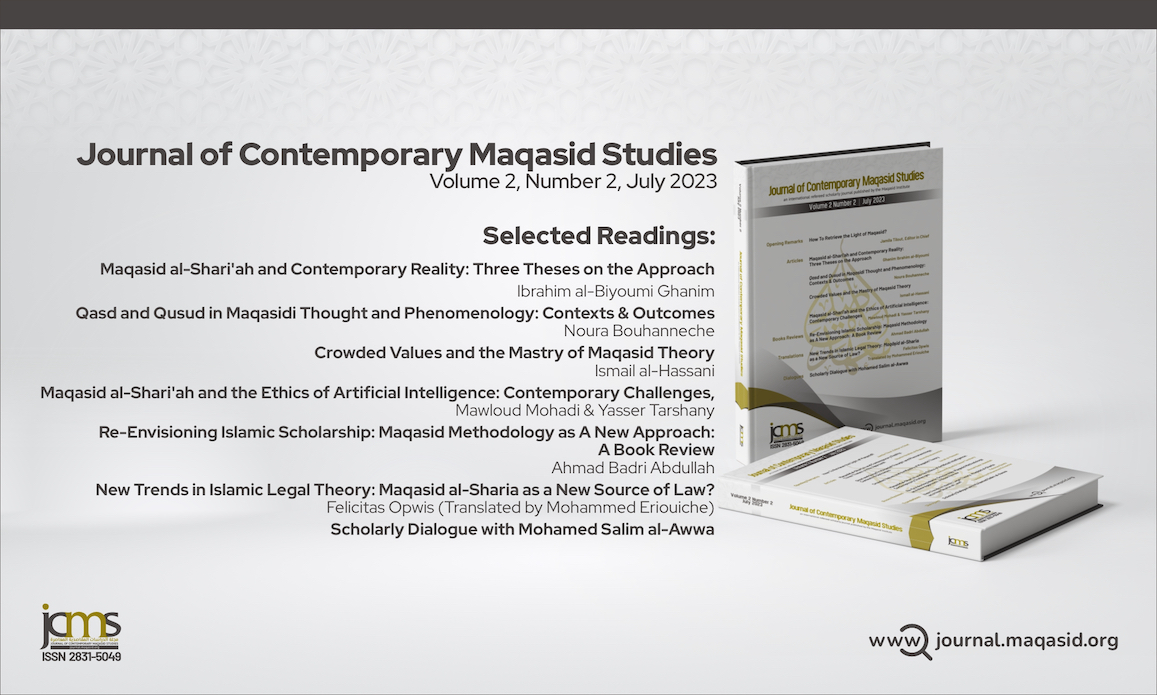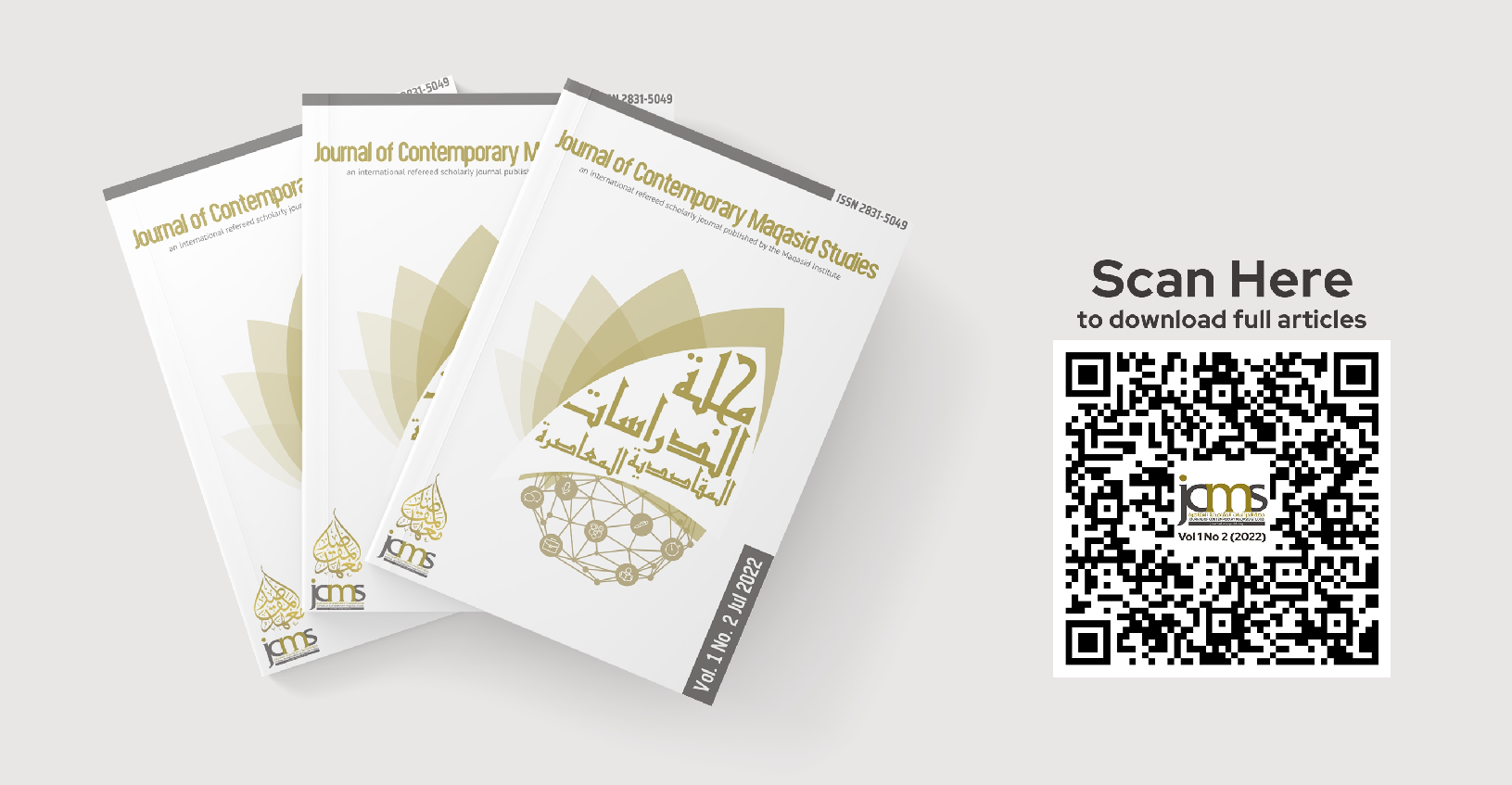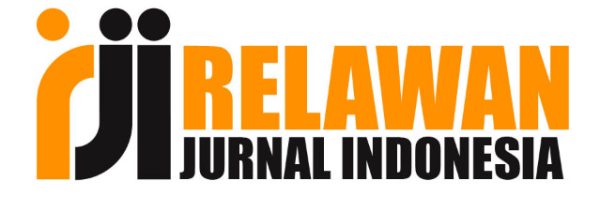Archives
-

Vol. 2 No. 1 (2023)
The Fundamentals of Tafsīr (Usūl Al-Tafsīr): Towards a Structural Study for a Contemporary Exegesis of the Holy Qur’anThe Holy Qur'ān, which is the foundation of the Arab-Islamic culture, has paved the way for the production of several clusters of knowledge and sciences throughout the history of Islam. Ilm al-Tafsīr (the science of exegesis) was among the most prominent Islamic sciences that aimed at interpreting the Qur’ānic discourse from various approaches. The commentaries were to some degree influenced by the formation of mufassirīn (scholars of exegesis), contextual challenges, and the aspirations to keep pace with the new occurrences of their times.
However, the different commentaries of the Qur’ān have yet to reach an integrated conception of the fundamentals of tafsīr as a methodological framework that structures and guides the process of exegesis. This framework should implement a holistic and integrative approach that incorporates the sciences of tafsir and the methodological and epistemological Islamic sciences.
Hence, the Third Issue of the Journal of Contemporary Maqasid Studies attempts to lay out the theoretical and structural elements of the fundamentals of tafsīr in a contemporary context by investigating the following questions:
How can we develop a constructively critical approach to the opinions of the classical scholars of tafsir and their methodologies to reactivate the hegemony of the Qur'ān?
What are the features of the network system in the fundamentals of tafsīr that formulate the epistemological and conceptual perception of history, reality, and the future?
How can we achieve interconnectivity between the fundamentals of tafsīr and the sunnah to develop a comprehensive worldview for exegesis?
To what extent can the maqasid methodology contribute to activating the hegemony of the revelation and the Qur’ānic objectives in contemporary exegesis?
Link to download full issue: JCMS V2N1 2023
The Journal of Contemporary Maqasid Studies is an international refereed scholarly journal published by the Maqasid Institute journal.maqasid.org ISSN 2831-5049 -

Vol. 3 No. 1 (2024)
Contemporary Maqasid Projects: An Evaluation and Rectification
The maqasid studies have known a substantial accumulation of knowledge demonstrated by one of the most descriptive and statistical works carried out by the late Dr. Muhammad Kamal Al-Din Imam entitled “Al-Dalil al-Irshadi Ila Maqasid al-Shari`ah [Guidelines for the Objectives of Islamic Law]. Institutionally, there had also been several research centres dedicated to “maqasid” within the Muslim and Western worlds, providing significant qualitative and quantitative works on the epistemological and methodological maqasidi thought.
Accordingly, the Fifth Issue of the Journal of Contemporary Maqasid Studies focuses on understanding the maqasid-based knowledge produced by these research centres and institutions and their impact on the maqasid research in order to evaluate and rectify it for the development of the maqasid methodology within the following compasses:
- The “maqasid project” at the Centre for Maqasid al-Shari`ah Studies
- The “maqasid project” at the Maqasid Institute
- The “maqasid project” at the Maqasid Centre for Studies and Research
- The “maqasid project” at the International Institute of Islamic Thought
- The “maqasid project” at the Journal of Al-Muslim Al-Mu’asir
- The “maqasid project” at the Centre for Civilizational Renewal, Legal & Future Studies
- The “maqasid project” in Kamal Al-Din’s “Al-Dalil al-Irshadi Ila Maqasid al-Shari`ah”
Download Full Articles HERE
The Journal of Contemporary Maqasid Studies
is an international refereed scholarly journal published by the Maqasid Institute
journal.maqasid.org
ISSN 2831-5049
-

Vol. 4 No. 1 (2025)
Maqasid al-Sunnah: a Method for Research and Knowledge
The seventh issue examines the objectives of the Noble Prophetic Sunnah, in an attempt to shed light on the meaning and values of the Sunnah of Prophet Muhammad SAAW. Dr Anas Al-Sarmini participated in this issue with a valuable study entitled: “The Prophetic Sunnah in Light of Imagined in Religion: Methodological Criticism or Ideological Projection?”, Dr. Muhammad Asbihi also contributed with an important paper on extracting the features of the objective of social justice and the mechanisms for activating it in the Prophetic Sunnah. This issue also features a group of valuable studies, outside the issue main theme, including Prof. Dr Jasser Auda's study on “The Objectives as a Basis for an Integrated Framework and Methodology”, Dr Abdul Rahim Ait Abdul Salam's study entitled: “The Problem of Advancing and Delaying Between Preserving Religion and Preserving the Human Seld: Methodological Rules and Objective-based Benefits”, and also an article by Dr Muhammad Abdullah entitled: “Purification: Concept and Dimensions”. Moreover, this issue is adorned with a valuable book review by Najma Al-Zaghrioui of Clara Valli’s recently published book entitled “L’islam Des Temps Modernes: Retour Aux Origines. Etude Des Finalités De La Loi Islamique d’Ibn Achour”. We also have a valuable translation of Dr Al-Marakiby's article on Modernity and the Transformations of Maqasid Discourse: Towards a Fluid Fiqh? by Dr Mohammed Eriouiche. The seventh issue is concluded with a scholarly dialogue I conducted with Prof. Dr Muhammad Nasiri, professor of Sunnah and Hadith at Dar Al-Hadith Al-Hassania in Rabat, about the Sunnah and the methods of its understanding and application.
Download full issues JCMS 4-3-(2025).
-

Vol. 2 No. 2 (2023)
Challenges in the Contemporary Maqasid Methodology
The maqasidi thought has encountered a set of qualitative and quantitative challenges and problems, especially at the level of its methodology and epistemology that yielded an enormous impact on the rest of the Islamic disciplines. One of the prevalent problems related to the maqasid lies in the misappropriation and ambiguity of implementation due to researchers’ intent of correlating the maqasid with reality in order to implement/activate, and intertwine it with new theories.
Hitherto, the endeavors of “rationalizing” Islam have led to the acceptance of several modern "concepts", "theories", and "values" as ‘Islamic’ under the banner of maqasid. This has indeed produced several scientific dilemmas manifested in various areas of human knowledge.
Therefore, the Fourth Issue of the Journal of Contemporary Maqasid Studies sheds light on some of the epistemological and methodological problems in the maqasid methodology to improve and develop it. Appropriately, researchers are cordially invited to reflect upon the following themes:
- The maqasid methodology in light of taqlid (imitation) and tajdid (renewal)
- The maqasid methodology between the legal discourse and reality
- The maqasid methodology and the problem of sources
- The maqasid methodology and western methodologies.

Download Full Articles HERE
The Journal of Contemporary Maqasid Studies
is an international refereed scholarly journal published by the Maqasid Institute
journal.maqasid.org
ISSN 2831-5049
-

Vol. 3 No. 2 (2024)
The Objectives (Maqasid) of Family in Modern Times
Research on family issues has become of central importance in modern-day eras. Family as a subject has gained research prominence in multiple fields of knowledge including jurisprudence, law, legislation, psychology, sociology, economics, and others. Therefore, today we are faced with different approaches to the family in terms of its status and the roles of its members as well as the methods used to study it.
Therefore, from a "maqasid methodology" perspective that calls for integrating different knowledge and scientific fields, we invite researchers to contribute to this issue on the topic of “objectives (maqasid) of family in modern times”.
In this issue, we attempt to raise a number of questions:
How can the family objectives acquire authority over other fields of knowledge that deal with the theme of the family?
If family jurisprudence has taken up a large space in jurisprudential literature, how can one distinguish between what is static and changing?
Can families perform their functions and roles in a changing world?
What are the most important challenges that jeopardize the existence of families or cause them to fall short in performing their roles in both Arab and Western societies?Download Full Articles here.









